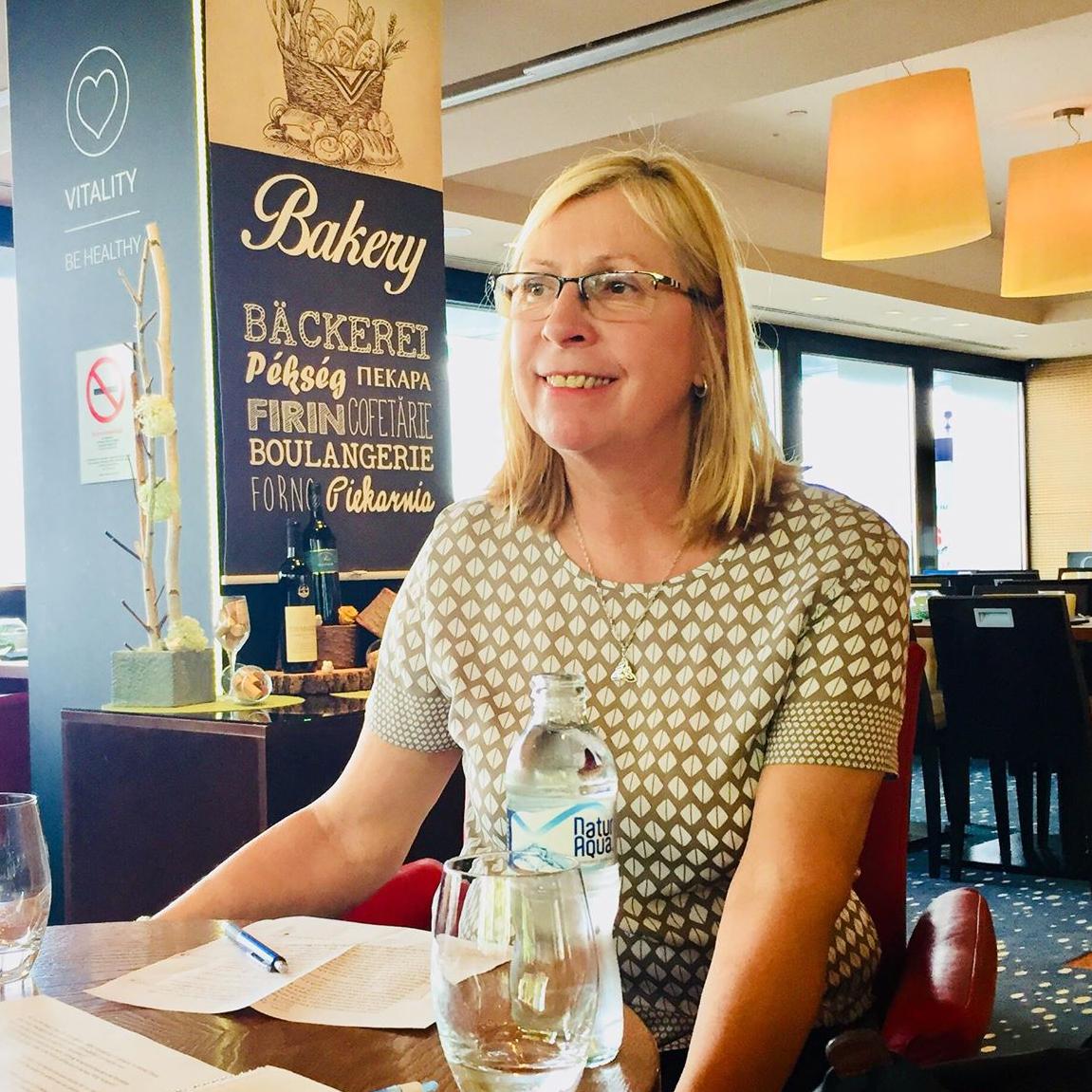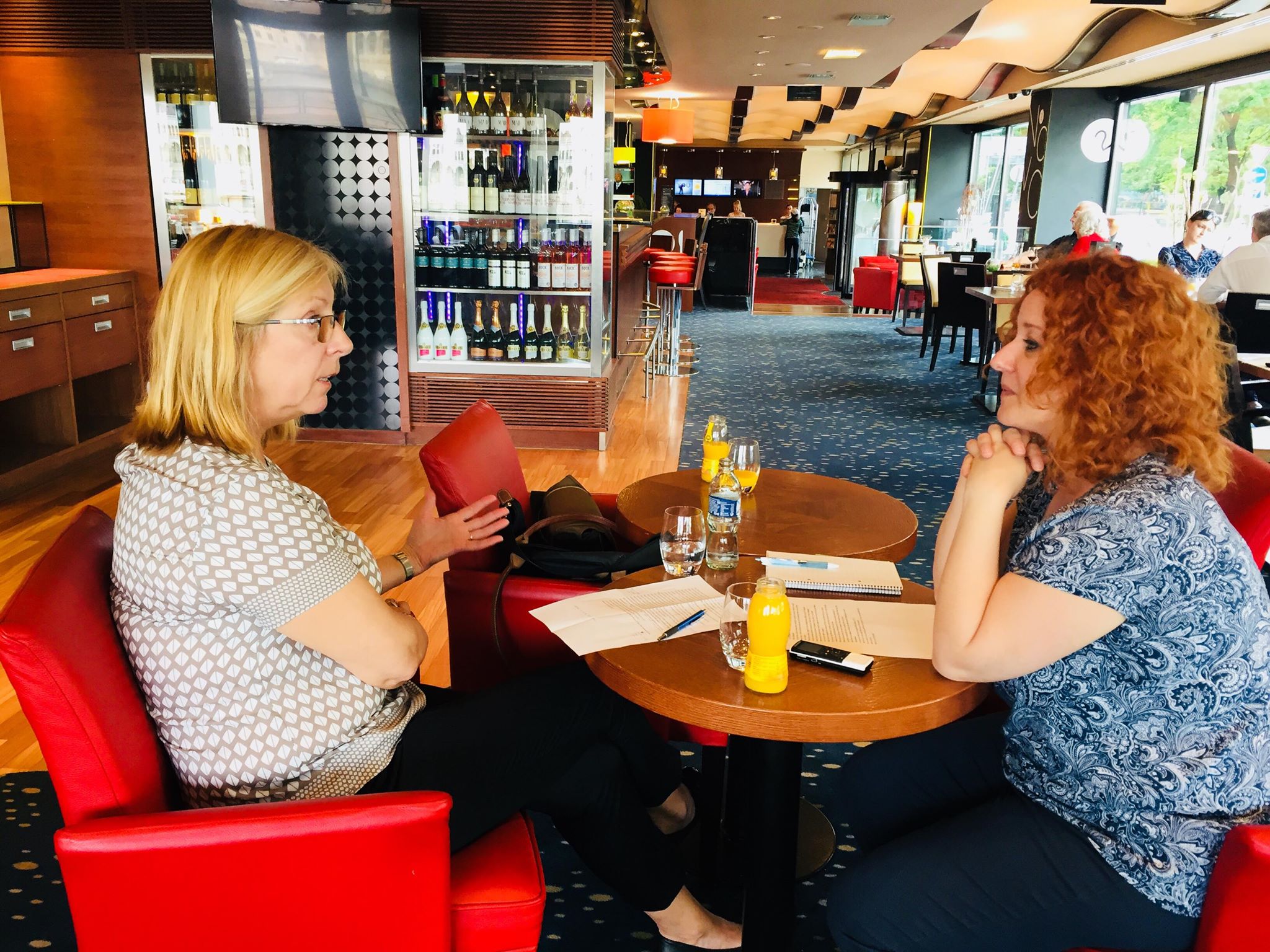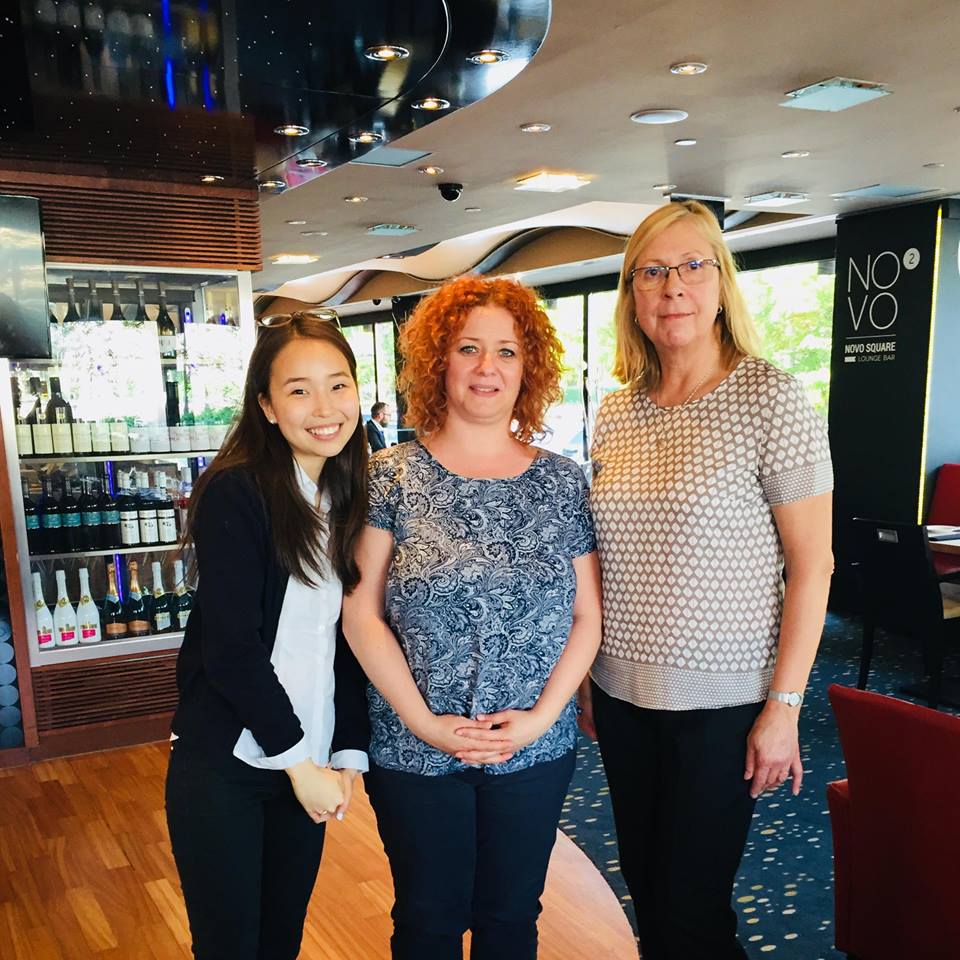
Anne Hütt, who is currently the Head of the Education Agency named Foundation Archimedes came to Budapest from Estonia to attend a Tempus Public Foundation event in this Spring (2018). Anne studied Hungarian language and literature at ELTE between 1976 and 1982 and was the manager of the Hungarian Cultural Office in the early 90’s. Our senior alumni coordinator Ms. Emese Zolnai and our alumni volunteer Gerel Ganbold did an exciting interview with her.
As I know you are the Head of the Education Agency called Foundation Archimedes in Estonia. Could you describe in a few sentences what your responsibilities are?
This education agency is dealing with several educational programmes. We have the big Erasmus+ programme, we have some regional EEA/Norway Grants programme, and the Estonian states finance the international scholarship schemes for improving mobility and the marketing of the Estonian higher education. I am responsible for all those programmes as an administrator of the department.
How come, that you studied in Hungary for 6 years at ELTE?
It is quite a long story because at that time in the 70’s, we were not independent, but we were in the Soviet Union. The Soviet Union and Hungary and most of those socialist countries had agreements to exchange students. I believe, that a lot of Hungarians studied in Moscow, in Kiev and in other states.
The Ministry of Higher Education in Moscow gave places to the universities. The Tartu University used to be and is still a quite famous research center for Finno-Ugric studies and from time to time, we got one place. I was quite lucky, because that year there was a place and I studied Estonian Language and Literature and my specialization was Finno-Ugric Studies.
When this place came, there were only two eligible people. At that time, if you were already married, or you had relatives in the West, then you were not allowed to go. If you did not have quite good grades, and you were not very successful in your studies, then you could not go either. So eventually, I got a place, and it was quite sudden. I had to decide in half an hour. I was 20 years old, and my parents lived in another city and I had to talk to them. They said no, you have to decide now, so I went to my friend and I asked: “What should I do?”
She said: “Say yes, if you have second thoughts you can always say no”. Then I said yes and I did not regret it. That was the situation at that time. Student did not choose the university.
How did your Hungarian stay begin? And what about the Hungarian language?
When I came here, I did not know which university I will go. There were two possibilities: ELTE or Szeged. All foreign students who arrived to Budapest, had to go to Budaörsi út, where there was an institute, which was called ‘Nemzetközi Előkészítő Intézet’. It was a special language-training institute for those foreign students, who came here. At that time, that institute had 50 different nationalities from all over the world: from Africa, Asia, from all those neighboring countries, like Russia. It was quite interesting. There was also another student from Estonia, so luckily I was not alone. She is still my friend; we shared a room in a dormitory.
We were divided into different groups according to what we were going to study. I was in the group of philologists and we had a very nice teacher. His name was Endre Kozma, and he taught us the grammar. I have never seen somebody to teach grammar in such an understandable way. That was my first success. I felt that it was not so difficult for me to learn Hungarian. Of course, I already had one year of Hungarian Studies at home because of Finno-Ugric Studies. Our teacher was a woman who had been in Debrecen for one year, so it was not completely strange for me. Finns and Estonians learnt quite quickly, because the structure of the languages is similar.

You told us that there were students from 50 countries. Was it hard to adapt to cultural differences?
When we arrived almost nobody talked any foreign languages. At that time, I do not think many people spoke English, not even Hungarians. German was more spread. Of course, we had some sort of knowledge of English, but I had Slavic and Romanian students in my group, so first we started to speak Russian. After half year, we realized we were speaking Hungarian. When we went to university after a year of language preparatory, we were listening to the lectures with other Hungarian students. I also had a Hungarian friend and this friendship helped me getting closer to Hungarians too.
What kind of knowledge did you have about Hungary when you came to Budapest in the 70s? What were your first impressions?
I already had some experience from the previous autumn before I came here, because I participated in the Finno-Ugric Conference, which was organized every five-year in a Finno-Ugric country. Therefore, I knew a little bit about Budapest, we spent 4-5 days here back then.
I arrived here for studying in 1976. There were people still living here from the Austrian-Hungarian Empire and you could see and feel that. For example, how people spoke… All the older gentlemen were saying: “Kezét csókolom”, “Maga”, “Ön”, “professzor úr”. It was a completely different world for me but in a charming way. When small children came to me and said “Csókolom”, it was just so nice.
What was or what is your favourite place in Budapest or Hungary?
The first place where we went with my friends, when we started a little bit to talk Hungarian, was Pécs. We hitchhiked. The second one was Esztergom, which I also like a lot. And Balaton... my Hungarian friend lives in Budapest, but she also has a house in Balatonfüred, so I go there quite often.
At that time, how did you spend your free time?
We did a lot of things. We went to Margitsziget or to jazz festivals. We always found something that we were interested in. There were many concerts, music, dance houses (táncház), film museum… lots of things we did not have at home. We liked it very much.
However, we also had to study quite hard. In Hungary, we had this exam, which is called “szigorlat”, we did not have this at home. That was rough. We had to repeat all those things we had studied for two years, than in one day we had a big exam. That was exhausting and I remember that it was in June in 1978 or 1979. It was all Hungarian Literature and all World Literature from two years, Language History and some other subjects. When we finished, we bought a few bottle of wine, some Egri Bikavér too, and went to the Buda Hills. We made a fire and fried bacon on it.
Were you homesick sometimes?
I think homesickness is a matter of the first year. Everybody felt homesick. Then I felt homesick after the third year or fourth year too, but then I suddenly realized I still had to do some things here. Homesickness is something you have to deal with. Friends and other things, programmes we were doing helped quite a lot. We also had the opportunity to travel home during summer holidays and in the winter, around New Year. Sometimes - when we were more experienced - we went home in Easter too.

You spent three years in the Hungarian Culture Office as well, where you were the manager…
Yes. There were two possibilities basically: to become a university teacher or to become a scientist. At that time, it was difficult. I could not go to the university and say hello, I am here again, and so many philologists went to the national library. I spent almost 7 years in the national library’s art department. I also had two babies during that period, which was very nice and interesting. Then the Soviet Union collapsed in 1991. We gained our independence and in 1992, there was already a cultural institute in Helsinki and a small office was established in Tallinn.
I also thought I should do something else, so I studied methodology of language teaching, and then I taught Finnish to Estonian adult learners for several years. After that, I was a project manager in banking association. It was a project of distance learning. Then I have realized that education is my field. I was managing the project; everything else was developed by banking people. I am very proud, as this course is still alive. It is now on the University of Tartu. Of course, it has been developed quite a lot. There are people who want to have distance learning, for example, Estonians, who are now abroad and they want to get some sort of a degree or qualification. After this project, I joined the Leonardo da Vinci Programme.
You said that you have two children. Have they studied abroad, and are they in any ways connected to Hungary?
My older daughter was a Rotary Exchange student in Germany and she went to work in England after graduation. Then she went to Stockholm University and she got a master degree in International Education. My younger daughter has travelled in the States and in UK. Now she studies Public Relations.
My older daughter has been in Hungary when she was 13. She participated in an English language course with her friend in Budapest. I have of course encouraged them, because I had my own experience. When someone asks me if she should go or not, I always say yes, even if it is only for 3 months, or half-a-year. It is a very valuable experience.
Do you have any suggestions for current students or for someone who is dreaming about the same career you have?
I never thought of career, I just did what I liked. It is always the best to do what you like.
When you are offered an opportunity, you have to grab it, if you feel that it is a little bit challenging or you can learn something from it. All those things I have done, I did not have any preparation for them. So just start it!